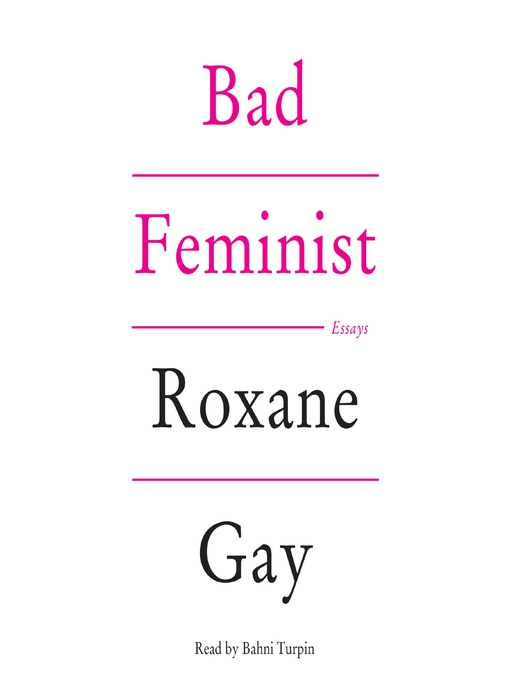
Bad Feminist
Essays
کتاب های مرتبط
- اطلاعات
- نقد و بررسی
- دیدگاه کاربران
نقد و بررسی

Bahni Turpin crisply delivers this expansive collection of essays. Author Gay covers an array of political, feminist, and culturally charged topics. Turpin sounds like she's giving a well-informed speech with the right inflections to emphasize specific points. Her tone is clear and deliberate, forcing one to focus on the content. As she recounts personal stories and numerous critiques of films and books, she draws listeners in with a matter-of-fact tone. Both humorous and raw moments are delivered with sharp clarity. Whether the topic is Gay's nemesis when playing in a Scrabble championship or deconstructing rape jokes, Turpin delivers with an assertiveness that will catch listeners' attention. T.E.C. © AudioFile 2014, Portland, Maine

Starred review from June 30, 2014
This trenchant collection assembles previously published essays and new work by cultural critic and novelist Gay (An Untamed State). Even though she loves pink, feels nostalgic about the Sweet Valley High series, and lets degrading rap lyrics blast from her car stereo, Gay is passionately committed to feminist issues, such as equal opportunity and pay and reproductive freedom. Writing about race, politics, gender, feminism, privilege, and popular media, she highlights how deeply misogyny is embedded in our culture, the careless language used to discuss sexual violence (seen in news reports of sexual assault), Hollywood’s tokenistic treatment of race, the trivialization of literature written by women, and the many ways American society fails women and African-Americans. Gay bemoans that fact that role models like Bill Cosby and Don Lemon urge African-Americans to act like ideal citizens while glossing over institutional problems in the education, social welfare, and justice system that exacerbate racism and poverty. Although Gay is aware of her privilege as a middle-class Haitian-American, she doesn’t refrain from advising inner-city students to have higher expectations. Whatever her topic, Gay’s provocative essays stand out for their bravery, wit, and emotional honesty. Agent: Maria Massie, Lippincott Massie McQuilkin.

March 15, 2014
"Salon" columnist, "PANK" coeditor, and "Rumpus" essays editor, with 9,600 followers on Twitter and 85,000 followers on Tumblr, Gay is a young cultural critic to watch. And she's just put herself on the map with a debut novel, "An Untamed State", about a young Haitian woman examining her assumptions after a violent kidnapping. Smart readers cannot afford to miss these essays, which range from socially significant art ("Girls; Django in Chains") and feminist issues (abortion) to politics (Chris Brown) and why Gay likes pink. With a 30,000-copy first printing and some intense publicity for a nonfiction paperback original.
Copyright 2014 Library Journal, LLC Used with permission.

September 1, 2014
In her first essay collection, American novelist Gay (An Untamed State) tries to define the place of feminism today, in a country where Robin Thicke's "Blurred Lines" and reality TV shows like Flavor of Love still find purchase. Incisive, self-aware, risky, and often funny, the author's writing is reminiscent of Nora Ephron's 1975 collection of feminist essays, Crazy Salad. While Gay also examines gender and pop culture, she adds texture and nuance to this conversation by taking up race and privilege, topics that are too often glossed over in feminist literature. The daughter of Haitian parents and raised mostly in Omaha, NE, Gay possesses a distinct perspective and singular voice. While she criticizes how little women's roles have evolved since the women's movement, she does so not to diminish feminism but rather to point out the increasing need for it and the need to redefine it--especially for younger generations who have largely been left out of the conversation. VERDICT Gay moves us in a positive direction by foregoing bitter rants and proselytizing and modeling instead on honesty, openness, and self-reflection. [See Prepub Alert, 2/24/14.]--Meagan Lacy, Guttman Community Coll., CUNY
Copyright 2014 Library Journal, LLC Used with permission.

November 1, 2014
Popular and prolific essayist and novelist Gay (An Untamed State) reflects on feminism, politics, and popular culture. (LJ 9/1/14)
Copyright 2014 Library Journal, LLC Used with permission.

July 1, 2014
Essayist, novelist and pop-culture guru Gay (An Untamed State, 2014, etc.) sounds off on the frustrating complexities of gender and race in pop culture and society as a whole.In this diverse collection of short essays, the author launches her critical salvos at seemingly countless waves of pop-cultural cannon fodder. Although the title can be somewhat misleading-she's more of an inconsistent or conflicted feminist-the author does her best to make up for any feminist flaws by addressing, for instance, the disturbing language bandied about carelessly in what she calls "rape culture" in society-and by Gay's measure, this is a culture in which even the stately New York Times is complicit. However, she makes weak attempts at coming to terms with her ambivalence toward the sort of violent female empowerment depicted in such movies as The Hunger Games. Gay explores the reasons for her uneasiness with the term "women's fiction" and delivers some not-very-convincing attempts to sort out what drives her to both respect and loathe a femalecentric TV show like Lena Dunham's Girls. Although generally well-written, some of these gender-studies essays come off as preachy and dull as a public service announcement-especially the piece about her endless self-questioning of her love-hate relationship with the tacky female-submission fantasies in Fifty Shades of Grey. Yet when it comes to race-related matters (in the section "Race and Entertainment"), Gay's writing is much more impassioned and persuasive. Whether critiquing problematic pandering tropes in Tyler Perry's movies or the heavy-handed and often irresponsible way race is dealt with in movies like The Help, 12 Years a Slave or Django Unchained, Gay relentlessly picks apart mainstream depictions of the black experience on-screen and rightfully laments that "all too often critical acclaim for black films is built upon the altar of black suffering or subjugation."An occasionally brilliant, hit-or-miss grab bag of pop-culture criticism.
COPYRIGHT(2014) Kirkus Reviews, ALL RIGHTS RESERVED.

























دیدگاه کاربران